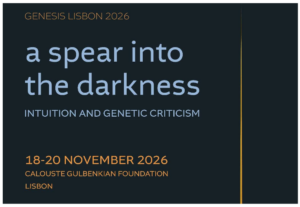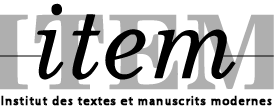07/11/2025, Lisbonne
 In 1981, the Swedish film director Ingmar Bergman stated that he made all his decisions based on intuition. “But then,” he continued, “I must know why I made that decision. I throw a spear into the darkness. That is intuition. Then I must send an army into the darkness to find the spear. That is intellect”
In 1981, the Swedish film director Ingmar Bergman stated that he made all his decisions based on intuition. “But then,” he continued, “I must know why I made that decision. I throw a spear into the darkness. That is intuition. Then I must send an army into the darkness to find the spear. That is intellect”([Bergman] 1981, 7).
In filmmaking, as in all arts, intuition is often considered a hallmark of creativity. Bergman’s statement highlights a familiar dichotomy in the characterisation of this touchstone. In terms of chronology, intuition precedes analysis. As to speed, it unfolds quickly, in contrast to the slow pace of enquiry. In respect of presence, intuition often corresponds to what is not
there because there was no time for it to be recorded. Regarding visual representation, it is often imperceptible and therefore obscure, differently from the clarity associated with reasoning. Finally, intuition is individual, unlike examination, which is plural (according to Bergman, it takes a whole army to trace the whereabouts of just one spear). Such a binomial is often the framework through which we approach artistic creation and scholarly enquiry into it. Regarding how writers select materials for literary composition, Daniel Ferrer identifies two main inclinations: “a vague intuition that something may become useful in the future or a lucid recognition of something that was sought for a precise purpose” (Ferrer 2004, 13). In his scholarly examination of writers’ handwriting in drafts, Wim van Mierlo employs a similar binomial: “Genetic scholars often comment on how inspired, quick and easy composition was, or how slow and strenuous it appeared. (…) But remarks like these are often based on intuition. The point is not that these scholars are wrong, but that their observations are not grounded in solid principles of analysis” (Van Mierlo 2023, 19).
Although our dual perspective on artistic creation and on the study of artistic creation is so deeply ingrained, it is arguable that intuition is not alien to critical enquiry. In 2021, Paola Italia revealed that the original title of Alessandro Manzoni’s masterpiece novel I Promessi Sposi (‘The Betrothed’) was not, as commonly believed, Fermo e Lucia, but rather Gli Sposi Promessi. Some Italian media outlets described this as an intuitive perception: « The scholar was the first to realise in 2021 that the title that appears on the manuscript “Gli sposi promessi”, preserved and exhibited in the Museo Manzoniano in Lecco, is not just the name of the second draft, but the true title of the first draft » (https://www.leccotoday.it/notizie/traduzione- americana-promessi-sposi-.html). However, this intuition was only possible due to Italia’s long-standing familiarity with Manzoni’s handwriting, thus suggesting that spontaneous perception requires training and is not random. This further suggests that intuition and analytical thinking are germane: in Bergman’s statement, rather than peasants or monks, it is the army who is sent to find the spear.

True, to some artists there seems to be no spear to be found, since there would be no room for intuition in the genesis of their works. Edgar Allan Poe, for example, claimed that nothing in the composition of his poem “The Raven” was “referrible either to accident or intuition — that the work proceeded, step by step, to its completion with the precision and rigid consequence of a mathematical problem” (Poe 1846, 163). Conversely, other authors, like the Portuguese writer Almeida Garrett, were willing to allow careful planning to be disrupted by unforeseen factors. When transcribing factual information for his historical drama Frei Luís de Sousa, he suddenly deviated from the sources, attributing some unhistorical features to one of the characters. The
messenger who brings news that causes a peripeteia in the play would not be an anonymous pilgrim, as found in the sources, but rather the first husband of the protagonist, who had been presumed dead for a long time. The ductus of the handwriting suggests that this was an annotation made on the spur of the moment. Rather than being a vestigial note (Van Hulle and Nixon 2024, 51), it turned out to be the tipping point of an extreme reorientation of the genetic process. And this reorientation was based on creative intuition.
—
TÉLÉCHARGER ICI L’APPEL A COMMUNICATION GENESIS LISBON 2026












